


Industrial Hanging Scales A Comprehensive Overview
In today's fast-paced industrial environment, precision and efficiency are paramount. One tool that has become indispensable in various sectors, including agriculture, manufacturing, and shipping, is the industrial hanging scale. This article delves into the importance, functionality, and various applications of industrial hanging scales, highlighting why they are a critical asset for businesses that depend on accurate weight measurement.
What Are Industrial Hanging Scales?
Industrial hanging scales, often referred to as crane scales or balance scales, are devices designed to measure the weight of heavy items suspended from them. They typically consist of a robust hook or platform to hold the item being weighed and a display that shows the weight. These scales are built to handle substantial loads, often exceeding several tons, making them ideal for heavy industries where conventional weighing methods are impractical.
Key Features and Functionality
One of the standout features of industrial hanging scales is their ability to provide accurate measurements in challenging environments. Most models are equipped with high-strength materials that can withstand harsh conditions, including extreme temperatures and exposure to dust and moisture. Many scales also come with features such as
1. Digital Displays These provide clear and easy-to-read measurements, which are crucial for quick decision-making in busy environments. 2. Wireless Technology Modern industrial hanging scales often come with Bluetooth or Wi-Fi capabilities, allowing measurements to be transmitted wirelessly to computers or mobile devices for remote monitoring. 3. Overload Protection To ensure safety and longevity, many scales feature overload alarms that alert users when the weight surpasses the maximum limit. 4. Battery and AC Power Options Many models can operate on batteries or connect to AC power, providing flexibility based on the workplace setting.

Applications Across Industries
Industrial hanging scales are utilized in a wide variety of sectors, showcasing their versatility
- Manufacturing In manufacturing plants, hanging scales are often used to weigh raw materials before they are processed or to measure finished products before shipping. - Shipping and Logistics Accurate weight measurement is crucial in shipping. Utilizing hanging scales facilitates compliance with transportation regulations and helps optimize shipping costs. - Agriculture Farmers and agricultural businesses use hanging scales to weigh produce and livestock, ensuring they meet market standards and regulations. - Construction In the construction industry, hanging scales can be used to weigh materials such as steel beams or heavy equipment before they are lifted into position.
Advantages of Using Industrial Hanging Scales
The benefits of integrating industrial hanging scales into operations are manifold. Firstly, they increase efficiency by providing immediate weight readings that facilitate faster decision-making. Secondly, they enhance safety as they are designed to handle significant loads securely, reducing the risk of accidents associated with improper weight handling. Additionally, their portability means they can easily be moved from one location to another, making them particularly beneficial for dynamic work environments.
Conclusion
In conclusion, industrial hanging scales are critical tools in modern industry, offering precise and flexible weight measurement solutions across various applications. Their robust design, ease of use, and advanced technology enable industries to optimize operations, ensure safety, and maintain compliance with regulations. As industries continue to evolve and demand for accurate data grows, the importance of efficient weighing solutions like industrial hanging scales only continues to rise. Investing in high-quality hanging scales can significantly impact productivity and operational efficiency, ultimately driving business success in a competitive landscape.



